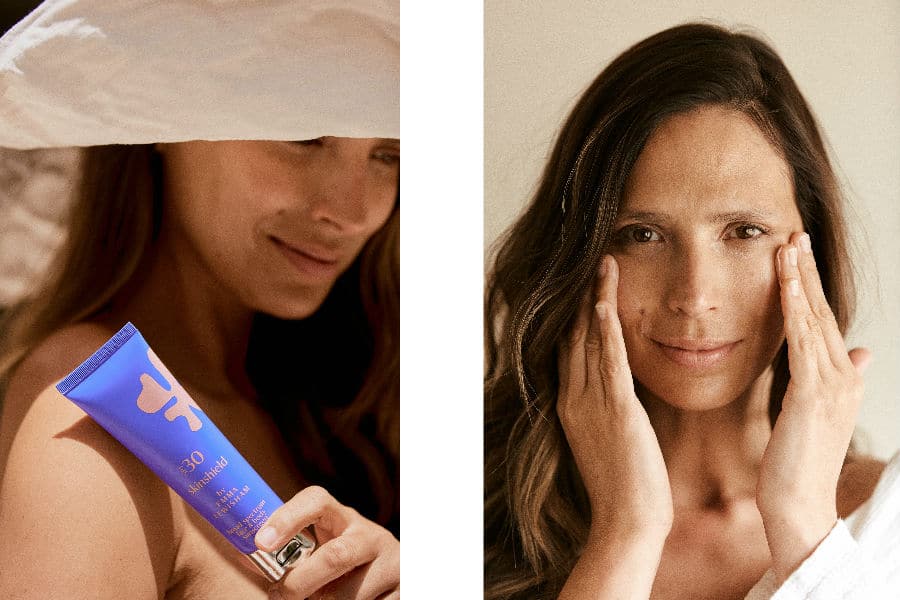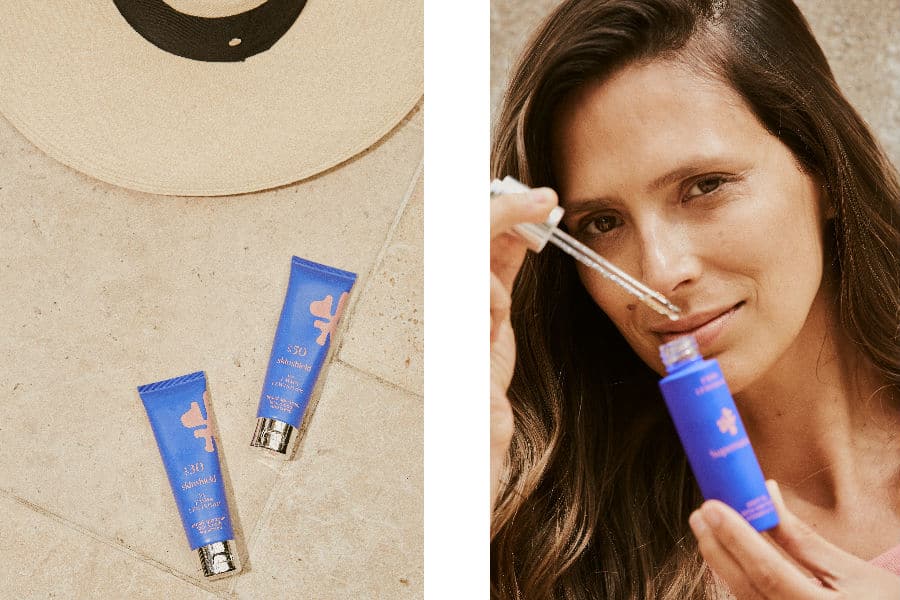
What does clean beauty actually mean? In fact, what does sustainability mean when it comes to beauty? Emma Lewisham, founder and CEO of Emma Lewisham journey into beauty began like many before her: dissatisfaction. From the formulations to the packaging - there was nothing that suited. So she founded her own line of premium, high-performance skincare. From her she partnered with TerraCycle, a waste management company and through them founded the Emma Lewisham Beauty Circle. An initiative that ensures all packaging goes through a second life cycle.
Here we spoke with Lewisham on discerning clean beauty from marketing, her partnership with TerraCycle and her favourite beauty brands on the market.
How did you get into beauty?
My journey into the beauty industry really started when I learned a product I had been applying for a personal skin issue (hyperpigmentation) contained a known carcinogen. Further research into it led me to uncover how unregulated the beauty industry is and that the last major changes were close to 100 years ago, despite credible research proving the impacts skincare can have on our health.
I went looking to replace my skincare with truly natural and safe alternatives, with efficacious and evidence-backed results – only to find this didn't exist. I was used to investing in high-performance, premium cremes and serums. Suddenly I found myself at organic health shops trying to find a natural equivalent. And I had the realisation that these products were not going to deliver the results I was used to. It became clear to me that all natural products came at a compromise to efficacy and evidenced-based results.
Around the same time, I also became aware about how wasteful the beauty industry is – it generates 120 billion units of packaging every year, with the majority of it unable to be recycled through kerbside recycling due to the complexity of the materials used. Packaging which is marketed as recyclable, is often “technically recyclable” rather than practically recyclable and often ends up in landfill. Trying to find clean and efficacious skincare was hard in itself. But finding brands that were truly focused on moving towards a circular model was also challenging.
I decided to be the change I wanted to see in the beauty industry. And wanted to prove it was possible to produce 100% clean, naturally-derived and safe products that would be as effective, if not more so, than high-end cosmeceuticals. Also, I wanted to prove to women they didn't have to compromise their health for beauty. In short – I founded Emma Lewisham with a single purpose, which was to make a meaningful difference in the beauty industry. For me, achieving a meaningful difference means setting a new standard in skincare; proving that luxurious, high performing skincare doesn’t have to come at a trade-off to women’s health or the environment.
Why is clean beauty important to you?
Many consumers, myself included, expect products that are sold to us to be safe and free from any ingredients that are potentially hazardous to our health. What I’ve learnt about the regulations of the skincare industry has really surprised me. The primary responsibility of cosmetic regulation in New Zealand and Australia falls on importers and manufacturers. This is important for consumers to know, so they realise they need to take ownership for the products they buy and use as there’s no governing body looking at what’s in their moisturiser or foundation.
Clean beauty has largely emerged because the term “natural” has been overused and is slowly becoming redundant. Many brands who claim to be natural, aren’t fully 100% natural or even free from suspicious ingredients that are linked to harmful effects. For instance, they slip in the preservative phenoxyethanol to their formulation which allows them to make a paraben-free claim, but this is a synthetic and has been linked to adverse health effects. Our green scientists worked for months to crack the natural preservative code as we refused to use this ingredient.
All of this has led to the emergence of the term “clean”. Clean beauty is so important to me personally because within a very short timeframe, I lost my mother to cancer and became pregnant with my first child. It was a pivotal time in my life and put me on a path of thinking deeply about my lifestyle and the things I did every day. It was at this time that I began learning more about the ingredients in skincare and was realising that these products were not as safe for my health as I’d assumed. The standard of ‘clean’ skincare provides an assurance that ingredients will not compromise your health.
How do you define clean beauty? And how can consumers discern which products really are clean?
Clean, for us, is rigorous. It means a product that is made without any ingredients linked to harmful health effects from hormone disruption, to cancer, to skin irritation. Where some brands only ban 6 ingredients, Emma Lewisham products leave out 1,400 ingredients and all ingredients are rated clean of any harmful effects by the Environmental Working Group (EWG)’s standards – who are a leading independent authority. If it looks suspicious or in doubt, we leave it out.
I’d encourage anyone who’s concerned about the ingredients in their skincare to look them up on the Environmental Working Group (EWG’s) Skin Deep Database. They are an independent organisation which monitors ingredients in personal care products and rates individual ingredients according to their toxicity.
Clean also means a fair and ethical supply chain. Ingredients are sourced from ethical growers, we respect the community they come from and the biodiversity. For example, one of our botanical oils is sourced from women’s cooperatives in Morocco, giving them independence and income. Profits from the co-ops go into funding tutors to teach the women how to read and write, provide scholarships for their children to attend college, and healthcare costs. We're passionate about providing customers with transparency, what we call "farm to face" and having a direct line to the farms we source our ingredients from, working with them to grow alongside us and improve how we operate together.

Tell us about your partnership with TerraCycle?
As a bit of background on TerraCycle – they’re an innovative waste management company who have won over 200 awards for sustainability and have a mission to eliminate the idea of waste, which aligned with my values. They recycle products and packages that would otherwise end up being landfilled or incinerated, and really importantly, they recycle the unrecyclable. By this I mean items like complex plastic packaging (coloured plastics and push pumps as examples of these) that are commonly used in beauty packaging, but aren’t accepted or recycled by kerbside recycling programmes. Many consumers diligently clean and sort their kerbside recycling, not realising that much of their beauty waste goes to landfill.
The Emma Lewisham Beauty Circle is a response to this issue. It’s about rethinking the entire process of a beauty product’s lifespan. It moves us away from a linear model, to a circular beauty model – sustainability is the ultimate luxury.
The Emma Lewisham Beauty Circle is a free, incentive-based recycling programme to ensure all New Zealand facial beauty products are given a second life. You simply send 4 products at a time for recycling. All beauty brands’ facial products will be accepted and you receive a $15.00 Emma Lewisham voucher in return for your efforts. We need to work together to minimise waste and the issue is bigger than us, and this is why we accept other brands’ packaging waste for recycling. It’s also free to participate. And yes – it is available in Australia! The only difference is that we accept 4 Emma Lewisham vessels for recycling at a time, though we are hoping to expand this to include all brands’ facial skincare packaging to Australia by mid 2021. It’s something we’re working on at the moment.
We’ve set up the Beauty Circle in this way so it’s no-cost to the consumer (we pay for the programme as this is part of us taking ownership for our products throughout their entire lifecycle and end-of-life). It also recognises waste as a precious resource that has a value and is worth recycling and reusing, instead of going to landfill. From the start, we have set an ambitious goal to be a zero-waste, 100% circular brand. We will always take ownership for what we bring into this world. We have a vision of no beauty brands' packaging ending up in landfill and the industry moving away from disposability.
What has been the biggest lesson you’ve learnt through starting the Emma Lewisham brand?
I think tenacity is probably the biggest learning. When you launch a business (actually, years before you even get to the launch!) you really need to go with your gut and stick to your vision. We really challenged our suppliers on everything – from ingredient transparency to insisting we develop a 100% post-consumer recycled (PCR) sunscreen tube. The latter hadn’t been done before and we knew this would take plastic that was in circulation and divert it from landfill, with a really quantifiable positive impact on the environment. Challenging the status quo is never easy, and you need to pick your partners carefully and find ones that truly share your vision and values.
What are your favourite beauty brands and products?
My favourite brands are ones that are 100% natural, but still deliver results. Two Island Collagen, Aleph Beauty, Bodha perfume are some of my favourites.
What is your favourite way to care for your skin outside of products?
I am a vegetarian and eat very little dairy. Eating this way has so many benefits for the planet, but it also has given me so much energy and improved my health and skin. When you eat this way, you are filling your diet with so much fruit and vegetables (which has so many nutrients and vitamins which show up on your skin), opposed to the main aspect of your meal being meat (which only delivers you iron and fat to your diet).



